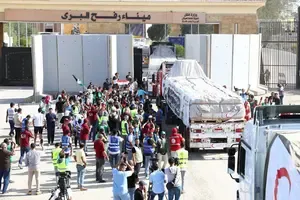Why Did the UN Welcome Israel's Temporary Lifting of Gaza Aid Blockade?

Synopsis
Key Takeaways
- The UN has welcomed the temporary lifting of the Gaza aid blockade by Israel.
- Despite this, the amount of aid permitted is deemed insufficient.
- The UN emphasizes the necessity for greater volumes of aid due to the ongoing humanitarian crisis.
- Concerns remain about the risks of looting and the security of aid workers.
- Israel has provided assurances regarding humanitarian protocols for aid distribution.
United Nations, May 20 (NationPress) The UN's under-secretary-general for humanitarian affairs and emergency relief coordination expressed appreciation for Israel's temporary suspension of an 11-week aid blockade on Gaza. However, he emphasized that the current volume of aid entering Gaza is insufficient.
"It is merely a drop in the ocean of what is critically needed," stated Tom Fletcher, UN under-secretary-general for humanitarian affairs. "A significantly larger amount of aid must be permitted into Gaza, commencing Tuesday morning."
The UN received assurances that aid operations would utilize existing, reliable channels, as reported by Xinhua.
"I appreciate that reassurance, along with Israel's commitment to humanitarian notification protocols that mitigate the substantial security risks associated with these operations," he added. "My goal is to ensure our aid reaches those in utmost need while minimizing the threat of theft by Hamas or other armed factions."
Historically, Israel has criticized the UN’s aid distribution in Gaza, claiming it enables Hamas to seize some of the provided aid for its own purposes. The UN denies this while acknowledging that looting does happen, whether by armed groups or desperate civilians.
"To combat looting, there must be a consistent influx of aid, and humanitarian workers must be allowed to utilize multiple routes," Fletcher remarked regarding the aid distribution challenges in Gaza.
Reportedly, the Gaza Humanitarian Foundation, backed by the United States and sanctioned by Israel, intends to take over the aid distribution, potentially sidelining UN operations.
This led Fletcher to assert that the UN's efforts are essential for providing aid to Gazans: "The UN has a clear, principled, and practical strategy to save lives on a large scale."
Addressing the dangers faced by aid workers as they resume operations amid escalating military actions by Israel, the relief chief highlighted that with ongoing bombardments and rising hunger levels, the risks of looting and insecurity remain high.
"It is our duty to do everything in our power to deliver aid, even in the face of these challenges," he said. "I am thankful to our humanitarian colleagues for their immense bravery and commitment. They embody the best of humanity."
Fletcher pointed out that the limited aid allowed into Gaza by Israel cannot replace the necessity for unrestricted access to civilians in severe distress.
He noted that an initial nine truckloads of aid were permitted to cross from Israel into Gaza through the Kerem Shalom checkpoint.
However, during a routine briefing, Stephane Dujarric, chief spokesperson for UN Secretary-General Antonio Guterres, informed reporters that by the end of the day, the truck's cargo had not been authorized for distribution by UN aid personnel.










